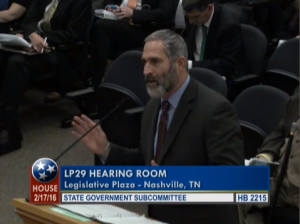Tennessee to consider open data standards under proposed legislation
A bill that would create a task force to study the feasibility of state government to utilize an open data policy cleared the House State Government Committee on Tuesday.
The task force created under the bill, H.B. 2215 / S.B. 2427, would:
(1) Examine whether state agencies may collect or create information in a way that supports downstream information processing and dissemination activities, including using machine readable and open formats, data standards, and common core and extensible metadata for all new information creation and collection efforts; (2) Ensure information stewardship by the state agencies through the use of open licenses and review of information for privacy, confidentiality, security, or other restrictions to release; and (3) Determine if the state can build or modernize information systems in a way that maximizes interoperability and information accessibility, maintains internal and external data asset inventories, enhances information safeguards, and clarifies information management responsibilities.
Task force members would mainly include representatives from key state departments, but also six appointments made by the governor, the speaker of the senate and the speaker of the house.
Jason Powell, D-Nashville, told a subcommittee who approved the bill last week that a couple of cities in Tennessee have open data policies, and that the state has pilot projects under way in the departments of finance, health and transportation. But creating a task force would help get everyone together to make progress.

Jeffrey Kriseman, chief data and informatics officer for the state of Tennessee. Click on picture to see video of discussion of bill in the House subcommittee.
Dr. Jeffrey Kriseman, the state’s chief data and informatics officer, told lawmakers in the subcommittee meeting last week that one of the biggest challenges in state government is the “siloed nature of data across agencies and departments.”
“One of the biggest problems that we see is the ability to now cross or integrate that data to make more contextual based decisions, to create a larger evidence base from which to make those decisions,” Kriseman said. “One of the pilot projects that we were working on was on prescription drug overdose. Prescription drug overdose has a system within Tennessee that you may be aware of called the CSMD, controlled substance monitoring database. That alone is not enough to give you context of what is going on.”
For example, he said, context from mental health data, and treatment protocols would give more contextual information for making decisions.
He said an open data policy would allow agencies to look at data in multidimensional ways. He explained there are two parts to open data – the open data portal that is public facing. And the internal side where data stewards maintain data and make it available internally to create better information.
Under the proposed legislation, the task force would report its findings and recommendations to the chairs of the state and local government committee of the senate and the state government committee of the house of representatives to the Feb. 1, 2017.
During the committee meeting on Tuesday, the committee chair, state Rep. Bob Ramsey, R-Maryville, noted that he was a member of the Advisory Committee on Open Government and he talked with the Office of Open Records Counsel about the legislation. “They said this bill would increase transparency of government records. So they were in favor of it.”
State Rep. Mary Littleton, R-Dickson, asked about access to better information and research and whether it would be available to lawmakers.
The House bill now moves to the House Government Operations Committee.
The Senate version of the bill is sponsored by state Sen. Jeff Yarbro, D-Nashville, and is on the calendar for the Senate Government Operations Committee for Wednesday.
